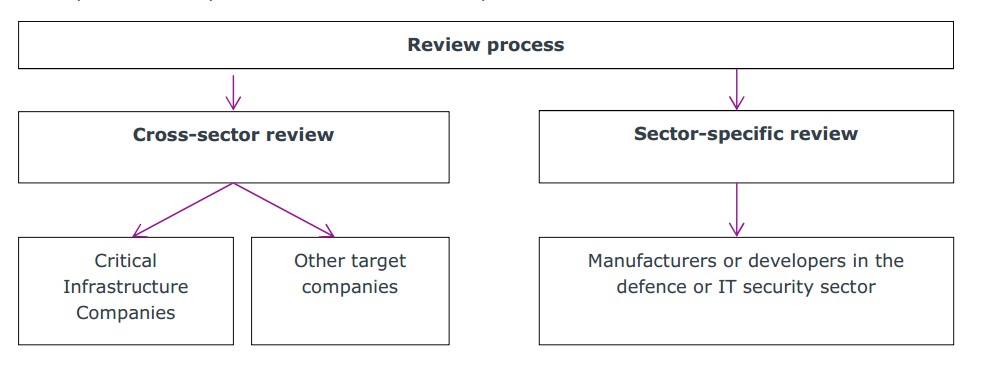Foreign Investment Controls in Europe: Germany
Introduction
The European Union ('EU') has one of the world's most open investment regimes. Nevertheless, there have been growing concerns in recent years about the impact of certain foreign investments on security and public order. A key issue has been the increasing level of Chinese foreign investment that takes place in the technology sector, with prominent examples in Europe including the takeover of the German robotics manufacturer Kuka by Midea and the attempted takeover of the chip equipment manufacturer Aixtron by Fujian Grand Chip Investment Fund.
Partly as a result of such acquisitions, member states of the European Union (the 'Member States') and EU decision-makers have become increasingly concerned about European know-how and consumer data being transferred to China and related security issues. In early 2017, Germany, France and Italy proposed in a letter to the EU Trade Commissioner that the Member States should be able to block investments from non-EU countries. At the same time, several Member States, including Germany and Italy, tightened or considered tightening their national investment control regimes. As of April 2020, 14 Member States[1] have national screening mechanisms in place aimed at preserving security and public order at national level. In November 2018, a political agreement was reached by the European Parliament, the Council and the Commission on an EU framework for screening foreign direct investment into the European Union and in March 2019 a regulation of the European Parliament and of the Council establishing a framework for the screening of foreign direct investments into EU was adopted. In March 2020, as part of the overall response to the economic effects of the COVID-19 pandemic, the European Commission issued guidance to the Member States concerning foreign direct investment and the protection of EU's strategic assets, in particular in healthcare-related industries.
Against this background, Ashurst Guantao (FTZ) Joint Operation Office seeks to give general insights into the foreign investment control regimes in the European Union and in the major European jurisdictions, including Belgium, France, Germany, Italy, Luxembourg, Spain, and the United Kingdom.
Please feel free to contact any of your Ashurst contacts in case of any questions.
The Ashurst Team
Germany
While Germany generally maintains a liberal policy with respect to foreign investments, there are review mechanisms in place which allow the government to scrutinise such investments for national security concerns. The applicable review mechanism depends on the industry sector in which the target company is active. Under the so-called 'cross-sectoral review', German authorities may examine corporate acquisitions in any industry sector if there is a danger to the public order or security of the Federal Republic of Germany. The so-called 'sector-specific review' applies to corporate acquistions in certain sensitive sectors (e.g. defence or IT security) which can endanger material security interests of the Federal Republic of Germany.
What are the key laws and regulations governing restrictions and controls of foreign investments?
The key laws that regulate foreign investments in Germany are the German Foreign Trade and Payments Act (Außenwirtschaftsgesetz, 'AWG') and the German Foreign Trade and Payments Ordinance (Außenwirtschaftsverordnung, 'AWV') that govern the control of corporate acquisitions by non-EU/EEA residents. There are no laws that would impose currency or exchange restrictions on foreign investors, except for certain notification requirements. There are also no laws restricting acquisition of real estate by foreign investors.
In addition to the general controls of foreign investments some specific restrictions may apply to acquisitions in specific sectors, for example acquisitions of qualified holdings in credit institutions.
How is a foreign investor defined?
Neither AWG nor AWV contain a definition of a foreign investor. The AWV provisions on cross-sectoral review refer to 'non-EU residents', meaning all natural and legal persons which are not EU residents. AWG defines EU residents as (i) natural persons resident or habitually resident in the European Union, (ii) legal persons or partnerships based or headquartered in the European Union, (iii) branches of legal persons based or headquartered in a third country if the headquarters of the branch are in the European Union and separate accounts are kept for them, and (iv) permanent establishments of legal persons from third countries if the permanent establishments are administered in the European Union. Investors from member states of the European Free Trade Association (EFTA) are equivalent to EU residents. Corporate acquisitions by EU residents are subject to cross-sector examination if there are indications of an abusive approach or a circumvention transaction which has been undertaken in order to avoid an examination. Such indications could exist in particular if the direct acquirer does not have notable own economic activities with the exception of the acquisition, or the direct acquirer has no permanent presence (premises,workforce or equipment) in the EU. Branches and permanent establishments of a non-EU buyer are not regarded as EU-residents.
The AWV provisions on sector-specific review refer to'foreigners', who are defined as any persons and partnerships who are not (i) natural persons resident or habitually resident in Germany or (ii) legal persons and partnerships based or headquartered in Germany. German branches and permanent establishments of foreign acquirers in Germany are also treated as foreigners. Also subject to examination are acquisitions by German residents where there are signs of an abusive structure or circumventing transaction applied in order to avoid scrutiny. Such signs may exist in particular if the direct acquirer does not have considerable independent economic activity or permanent presence (premises, personnel or equipment) in Germany.
Neither AWG nor AWV contain any special rules or restrictions with respect to investments made by foreign state-owned enterprises. However, in practice, this factor will likely be taken into consideration during the examination of the level of 'threat' of the investment.
Which transactions are scrutinised and which sectors are affected?
Subject to foreign investment control are acquisitions of direct or indirect shareholdings amounting to at least
• 10 per cent of voting rights in a German company being a Critical Infrastructure Company (as defined below under 'What are the assessment criteria?') or a Security-critical Company (as defined below); or
• 25 per cent of voting rights in other German companies.
Voting rights of third parties in the target company are attributed to the acquirer in calculating whether the above threshold requirements are fulfilled, if (i) the acquirer holds at least 10 percent (in case of Critical Infrastructure Companies or Security-critical Companies) or 25 per cent (in case of other companies) of voting rights in such third party In case of an indirect acquisition, the voting rights of the acquirer in the target company would amount to at least 10 per cent (in case of Critical Infrastructure Companies or Security-critical Companies) or 25 per cent (in case of other companies), if the acquirer and the respective intermediate shareholder hold, respectively, at least 10 per cent or 25 per cent of the voting rights in the respective subsidiary in accordance with the attribution principles described above.
In general, companies from all sectors are affected. The cross-sector investment review procedure applies in principle to all companies from all sectors regardless of their size. Specific rules apply to so-called Critical Infrastructure Companies.
The sector-specific review procedure applies to acquisitions of certain defence and IT security companies, including:
• Manufacturers and developers of weapons and certain other military technologies or specially designed engines and gearboxes for military tracked armoured vehicles; and
• Companies that manufacture or have manufactured and still hold such technology in relation to (i) products with IT security features that are used for processing classified government information or (ii) essential components for such products, if the entire product – with the knowledge of the company • has been approved by the German Federal Office for Information Security (Bundesamtfür Sicherheit in der Informationstechnik),
(such companies being 'Security-critical Companies').
Who is the decision-maker?
The review procedure is conducted by the German Federal Ministry of Economic Affairs and Energy (Bundesministeriumfür Wirtschaft und Energie, 'BMWi'). When reviewing an acquisition BMWi involve other federal ministries within the scope of the irrespective competences on a case-by-case basis. Prohibition of an acquisition requires the approval of the German government.
Is filing or approval mandatory?
Filing is mandatory with respect to corporate acquisitions falling within the scope of the sector-specific review. The notification must be made to BMWi in writing and must include basic information regarding the acquisition, the acquirer, the target company and the respective fields of business of the acquirer and the target company. The notification must be submitted by the direct acquirer.
With respect to corporate acquisitions falling within the cross-sector review filing is generally voluntary, except for acquisitions of Critical Infrastructure Companies (as defined below under 'What are the assessment criteria?'), in which case the conclusion of the acquisition agreement must be notified to the BMWi in writing by one of the parties. Moreover, BMWi may launch the review process on its own initiative by notifying the direct acquirer and the target company within three months after obtaining knowledge of the conclusion of the acquisition agreement and no longer however than five years following the conclusion of the respective agreement.
In order to obtain legal certainty at an early stage of the transaction, the acquirer may, prior to the planned acquisition, request BMWi to provide a certificate of non-objection confirming that the acquisition does not raise any concerns related to the public order or security. The written application for such a certificate must include basic information on the planned acquisition, the target, and the respective fields of businesses of the target company and of the investor. The certificate of non-objection is deemed to have been issued if the BMWi does not initiate a formal review procedure within two months from the receipt of the complete application.
What are the assessment criteria?
The assessment criteria depend on the type of the review procedure.
Cross-sector review procedure
In the cross-sector review procedure the BMWi evaluates whether the acquisition poses a threat to the public order or security of the Federal Republic of Germany, i.e. whether the acquisition represents a sufficiently serious and present threat which affects the fundamental interests of the society.
A threat to the public order or security may exist in particular if the domestic target company:
• Operates certain critical infrastructure which is of particular importance for the functioning of the community (in particular, energy, IT, telecommunications, finance, insurance, transport, health and water supply);
• Specially develops or modifies software which is used for the operation of critical infrastructure;
• Is responsible for certain organisational measures in the area of telecommunications surveillance;
• Manufacture or has manufactured technical installations for the implementation of telecommunications surveillance and has knowledge of such technologies;
• Provides cloud computing services and the infrastructure used for such services which qualifies as critical infrastructure in accordance with statutory law;
• Holds certain approvals for components or services in the area of telematics infrastructure; or
• Is active in the media industry and contributes to the formation of public opinion through broadcasting, telemedia or print and is distinguished by its particular topicality and broad impact,
(such company being a 'Critical Infrastructure Company').
The above catalogue is not conclusive, meaning that BMWi retains discretionary power to decide if a transaction constitutes a threat to the public order or security.
Sector-specific review procedure
The procedure evaluates whether the acquisition of certain defence and IT security companies poses a threat to the essential security interests of the Federal Republic of Germany.
What does the review process look like?
The review process varies depending on the sector in which the target company is active. The graphic below provides a simplified overview of the review process:

Cross-sector review
The BMWi may ex officio conduct a review if it notifies the direct acquirer and the domestic target company in writing of the initiation of a review procedure within three months from gaining knowledge of the conclusion of the acquisition agreement. In the case of an offer within the meaning of the German Securities Acquisition and Takeover Act (Wertpapiererwerbs- und Übernahmegesetz),the three-month deadline starts after obtaining knowledge of the publication of the decision to submit an offer or publication of the acquisition of control.The initiation of a review procedure is inadmissible after five years have passed since the conclusion of the acquisition agreement.
If a review procedure has been opened, the BMWi may, with the consent of the German government, prohibit the acquisition or make appropriate orders to ensure the public order and security of the Federal Republic of Germany within four months from presentation of the full set of documents. If and so long as the BMWi, as part of the review procedure, negotiates the contractual conditions for the acquisition with the parties involved in order to ensure the public order and security of the Federal Republic of Germany, the running of the four-month deadline is suspended.
Sector-specific review
The BMWi issues a clearance decision to the direct acquirer if there are no objections to the acquisition in terms of essential security interests of the Federal Republic of Germany. The clearance shall be deemed to have been issued if the BMWi does not launch a review procedure within three months from receipt of the notification.
If the BMWi launches a review procedure, it may request information and documents from the direct acquirer and from all parties directly or indirectly involved in the transaction. The required documents are specified in a general order (Allgemeinverfügung) of the BMWi and include, for example, information on the business and places of business of the target and of the investor, shareholder structure of the target and of the investor, consolidated annual financial statements of the target and of the investor for the last three years, business contacts with customers from the public sector over the past five years, the acquisition agreement and information on the short-, mid- and long-term commercial strategy of the target after completion.
After presentation of the full set of documents, the BMWi may prohibit the acquisition or make appropriate orders to secure the essential security interests of the Federal Republic of Germany within three months following receipt of the complete documentation. If and so long as the BMWi, as part of the review procedure, negotiates the contractual conditions for the acquisition with the parties involved in order to secure the essential security interests of the Federal Republic of Germany, the running of the three-month deadline is suspended.
What are the powers of the competent authorities and can they prohibit or otherwise interfere with a transaction?
In a cross-sector review procedure, the BMWi may either prohibit the acquisition or issue appropriate orders to ensure the public order and security of the Federal Republic of Germany. The issuance of orders or prohibitions requires the consent of the German Federal Government.
In order to enforce a prohibition, the BMWi may in particular:
• prohibit or restrict the exercise of voting rights in the target company which are owned by, or attributable to, the foreign investor; or
• appoint a trustee at the acquirer's expense, with the trustee being responsible for the rescission of an implemented acquisition.
In a sector-specific investment review procedure, the BMWi may, with the consent of the German Federal Government, prohibit the acquisition or make appropriate orders to secure the essential security interests of the Federal Republic of Germany.
How long does the review process take?
Cross-sector review
The period for issuing a certificate of non-objection upon application of the investor is two months following the receipt of a complete application. Following the lapse of this deadline the certificate of non-objection is then deemed to have been issued if the BMWi does not initiate a formal review procedure.
If no clearance certificate was applied for and BMWi determines that the acquisition may pose a threat to public security or order, it may initiate a formal review within three months after obtaining knowledge of the conclusion of the acquisition agreement and no longer than five years following the conclusion of the respective agreement. The formal review needs to be completed within four months following receipt of complete documentation.
Sector-specific review
Clearance is deemed to have been issued if the BMWi does not initiate a formal review within three months after obtaining a (mandatory) notification. If a formal review is initiated BMWi has three months following receipt of the complete notification to prohibit the transaction or impose mitigation measures.
The review period is suspended for the term of negotiations between BMWi and the parties of the transaction on regulatory conditions or mitigation measures.
How much does the review process cost?
There are no filing fees or charges.
What is the degree of transparency?
Generally, the BMWi has to treat any information received as strictly confidential. However, there is a cooperation mechanism at the EU level that requires EU members states to share information with the EU Commission and other EU Member States.
What are the consequences of the lack of clearance?
No sanctions are foreseen with respect to the failure to notify the BMWi of the acquisition. The parties are in principle free to close the transaction before obtaining the clearance from the BMWi. However, this would result in a legal uncertainty regarding the transaction. Therefore, clearance by BMWi is usually a closing condition.
Intentional or negligent non-compliance with prohibitions or orders issued by the BMWi may be sanctioned as an administrative offence and lead to an administrative penalty.
Is there a right to challenge?
Any decisions taken by BMWi/German Federal Government are subject to judicial review by a competent administrative court on the grounds of an inadmissibility or unlawfulness of the decision.
Are any significant changes planned?
On 31 January 2020, BMWi published the draft amendment to AWG. The planned changes aim at strengthening the foreign investment review in order to better protect German and European security interests and implementing the EU Screening Regulation. In particular, the screening standard shall be changed and the examination will depend on whether an acquisition leads to an 'expected impairment' rather than an 'actual threat'. In addition to the effects of an acquisition in Germany, the examination shall also focus more strongly on effects on other EU member states as well as on EU programmes and projects. Furthermore, closing of an acquisition subject to reporting requirements shall be suspended for the duration of the examination. In the second step, the AWV shall also be amended, including in particular a definition of the catalogue of critical technologies.
The recent outbreak of the COVID-19 pandemic has not (yet) resulted in any proposals of further legislative changes to the German foreign screening regime [2]. However, it is likely that Germany will follow the FDI Guidance. Moreover, the COVID-19 pandemic may result in a more extensive interpretation of the existing legal framework, in particular with regard to the understanding of the concept of 'public order and safety' and result in more restrictive controls of investments in companies from the pharmaceutical, healthcare and medical protective equipment industry.
[1] According to the List of screening mechanisms notified by Member States, dated 12 December 2019: Austria, Denmark, Finland, France, Germany, Hungary, Italy, Latvia, Lithuania, Netherlands, Poland, Portugal, Romania and Spain. The United Kingdom is technically no longer an EU Member State following its decision to exit the EU, although it remains subject to EU rules for a transitional period, which currently lasts until 31 December 2020. The UK does have a national screening mechanism, although there have been proposals to strengthen it.
[2] However, in its meeting on 31 March 2020, as a result of COVID-19 pandemic the Bavarian government decided to request that the German Federal Government takes certain measures to further restrict the foreign investment review by, among others, extending the review process to acquisitions of at least 10 per cent of shares in medical technology, pharmaceuticals and critical raw materials companies and lowering the review threshold for all industries to 10 per cent for a limited period of time.
Key Contacts
Belgium

David Du Pont
Partner
T +32 2 626 1923
M +32 471 129987
david.dupont@ashurst.com
France

Anne Reffay
Partner, Avocat à la Cour
T +33 1 53 53 54 99
M +33 6 11 49 04 71
anne.reffay@ashurst.com
Germany

Matthias von Oppen, LL.M.
Partner
T +49 (0)69 97 11 28 32
M +49 (0)170 63 26 165
matthias.vonoppen@ashurst.com
Luxembourg

Isabelle Lentz
Partner, Avocat à la Cour (Luxembourg)
T +352 2813 3222
M +352 621 798357
isabelle.lentz@ashurst.com
Spain

Jorge Vázquez
Partner
T +34 91 364 9899
M +34 676 622 948
jorge.vazquez@ashurst.com
United Kingdom

Neil Cuninghame
Partner
T +44 20 7859 1147
M +44 7917 064 750